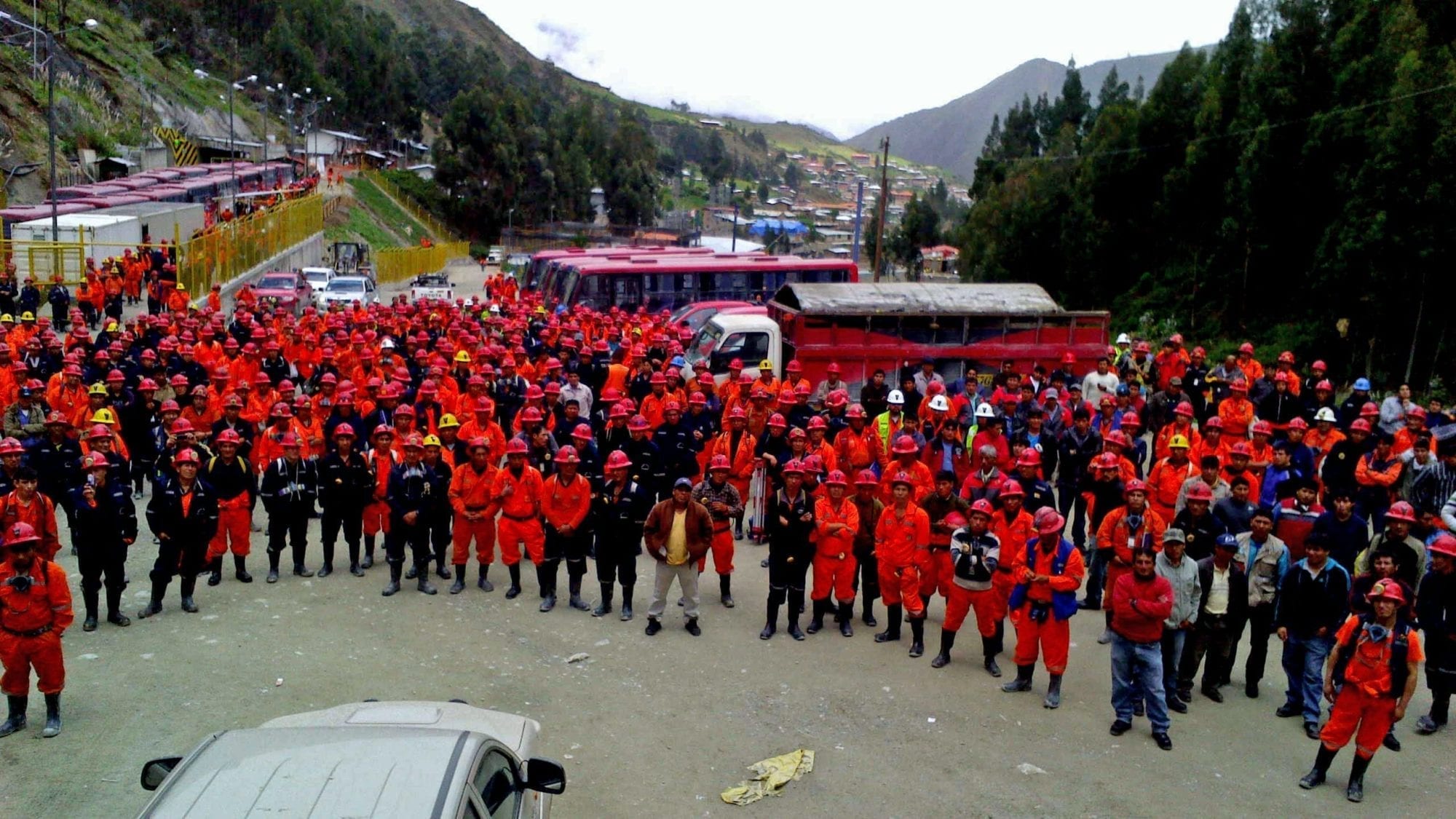
Mar 29, 2016
Oscar Muro, Solidarity Center program officer in Peru, reports on his late February fact-finding journey to the Minera Aurifera Retamas (MARSA) mine, where subcontracted mineworkers, represented by a strong union, won a national labor inspection finding that calls for 2,464 outsourced workers to be moved to permanent contracts. The workers subsequently went on a weeklong strike to protest the employer’s appeal of the judgment and a ruling by the regional labor authorities that MARSA should not be fined for misclassifying workers. The national labor inspection office indicates it will return to the mine in a few weeks to ensure the company has correctly classified miners.
……………..
Together with Ricardo Juárez, secretary-general of the Federation of Mine and Metalworkers of Peru, and Elder Villalobos, secretary general of the union of workers of the companies of MARSA, I traveled to the mining center in the mountains of La Libertad to attend the union’s extraordinary general assembly. There, the secretary general told the 4,500 workers in attendance that, following mine inspections, the national Superintendent of Labor Inspection had ruled in favor of 2,464 of 4,000 subcontracted workers, stipulating that they become permanent workers.
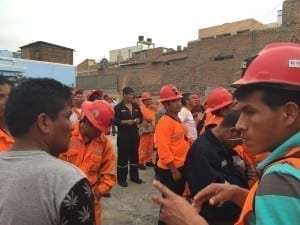
Miners are standing strong in their demands for permanent contracts. Credit: Solidarity Center/Samantha Tate
Many MARSA workers have labored in dangerous conditions for up to 20 years, but without a contract. Their “non-permanent” status means their livelihoods are jeopardized if they raise safety issues with their employer, or demand decent wages that allow for a life with dignity.
In January, one miner died on the job, and two miners perished in 2014. In November 2015, there was a deadly radiation poisoning and suffocation incident at the Taurus mine.
Mine is Rich, Yet Residents still Poor
The MARSA mine, 4,000 feet above sea level in the Southern Highlands, produces gold in large quantities and ranks among Peru’s top five gold producers. The journey to MARSA takes more than 14 hours from the northwestern coastal city of Trujillo. To reach the mining center, we had to cross hill after hill on a single-lane road. When our bus encountered a vehicle coming the opposite direction, the vehicles struggled to pass each other on the narrow stone trail. We made the trip to join our co-workers who need us, and thank God, everything went well.
Some 7,000 people live in Llacuabamba, the village where the MARSA mine is located. Despite the wealth beneath their soil, the residents do no benefit from investment, such as proceeds from mining licenses. Instead, their village suffers from poor sanitation infrastructure and is so isolated that residents do not receive newspapers and often do not have access to television because of the weak Internet signal.
Solidarity with Miners
Together with Juárez and Villalobos, we conveyed to the workers that we stand in solidarity with them in their struggle until they achieve victory: worker rights through permanent contracts.
During this journey, we also learned about informal mines in the area, which employ between 3,000 and 5,000 miners. Further, at the nearby Consortium Horizon mine, the more than 4,000 employees have sought to form a union several times, only to see many workers fired. We have much work ahead to assist all of these workers in getting permanent contracts and the safe and healthy working conditions all workers deserve.
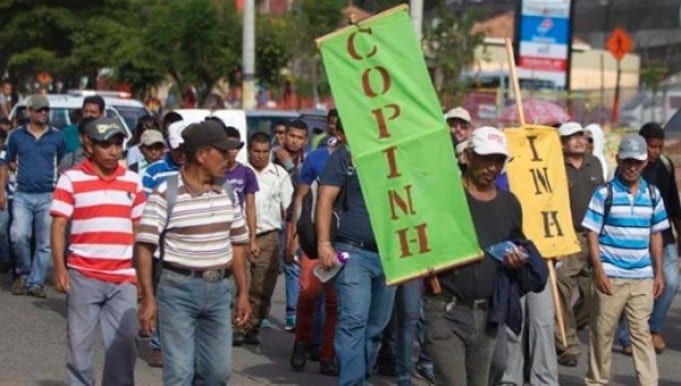
Mar 18, 2016
The murder of a second Honduran rights activist, Nelson Noé García this week, days after the assassination of Berta Cáceres, a globally recognized leader for indigenous rights and environmental justice, has widened international outrage and amplified demands for justice, security, respect for basic rights and an end to impunity for perpetrators.
The Center for International Justice and Rights strongly condemned Nelson’s murder. Marcia Aguiluz, CIJR director for Central America and Mexico, said it “proves that the spiral of violence against indigenous peoples fighting for their territories in Honduras remains with impunity.”
García, 38, a father of five, was a member of the Council of Indigenous and Popular Organizations of Honduras (COPINH), co-founded by Cáceres. Local media report that García received four gun shots to the face and suggest the attack followed the forceful eviction of at least 150 families in the village of Tilapia by military police.
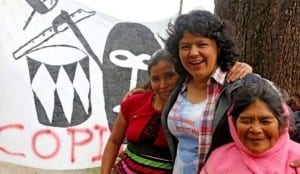
Berta Cáceres (center), murdered March 3, won the prestigious Goldman Environmental Prize for her opposition to one of the region’s biggest hydroelectric projects. Credit: Democracy Now!
The same day as García’s murder, the president of Unified Campesino Movement of the Aguán, another indigenous group, was briefly arrested on questionable charges; Cristián Alegría, a campesino activist, was shot at; and David Romero, a journalist critical of the government, was sentenced to 10 years in prison. In addition, Gustavo Castro, a Mexican activist who witnessed Cáceres’s murder, has been prevented from leaving the country.
Targeted murders of human rights activists and union members have helped make Honduras one of the most dangerous countries in the world for human rights defenders.
Union activists are targeted to silence demands for economic justice, freedom of association and other basic rights. Over the past 12 months, the Solidarity Center has documented 13 cases of threats or violence against union activists, including the disappearance of Donatilo Jiménez in April 2015, the murder of Héctor Martínez Motiño in June, and repeated death threats against longtime Solidarity Center allies Tomas Membreno and Nelson Geovanni Nuñez Chávez, both of the Sindicato de Trabajadores de la Agroindustria y Similares (STAS) industrial agricultural workers’ union.
In the United States, more than 60 Congress members yesterday asked Secretary of State John Kerry and Treasury Secretary Jacob Lew to suspend aid to Honduras security until an international investigation into the murder of Cáceres.
The Inter-American Commission on Human Rights had mandated “precautionary measures” to protect Cáceres, Motiño and Jiménez—which were not borne out in practice. This week, 23 U.S. Congress members sent a letter to U.S. Secretary of State John Kerry urging the State Department to take concrete action to address the situation of activists in Honduras.
The AFL-CIO has expressed deep concern with human rights and sustainable development in Honduras based on the findings of an October 2014 labor delegation that met with labor and community organizations, the Honduran government and the U.S. embassy.
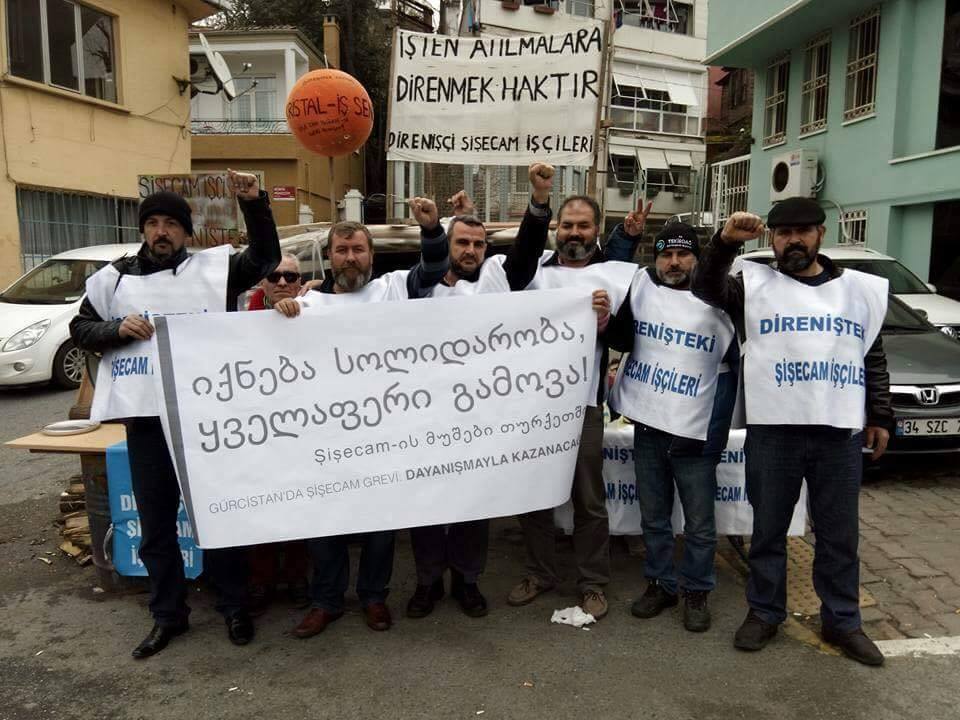
Mar 17, 2016
In Georgia, coal miners in Tkibuli and glass factory workers in Ksani recently made big gains at the workplace with the assistance of the Metal Workers, Miners and Chemical Industry Workers’ Trade Union (MMCIWTU) and the Georgian Trade Unions Confederation (GTUC).
Despite tough opposition from their employers, both groups of workers waged successful strikes and won significant wage increases, with miners also gaining key job safety and health improvements.
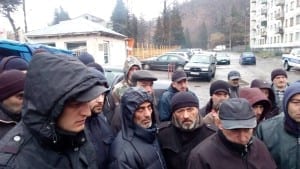
Miners in Georgia won key contract demands, including a wage increase and improved job safety and health. Credit: MMCIWTU
Some 750 miners went on strike in February, seeking wage increases promised during their last strike in 2011. The workers, employed by the Georgian Industrial Group (GIG), which operates two mines in Tkibuli, walked out before notifying union leadership of their intention.
But with GTUC President Irakli Petriashvili and MMCIWTU President Tamazi Dolaberidze at the bargaining table, miners returned to work in 16 days with a new contract that includes a 7 percent pay increase starting March 1 and an additional 3 percent hike beginning April 1—and will be paid for half of the days they spent on the strike with no punishment for strike leaders. The company also has agreed to address salary imbalances.
GIG supplies coal from Tkibuli primarily to cement-producing factories in Georgia and is one of the country’s largest corporations, with operations in energy generation, natural gas and real estate.
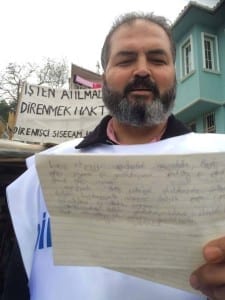
JSC Mina factory workers received wide international support for their strike. Credit: MMCIWTU
At the JSC “Mina” glass container factory, 170 workers—80 percent of the workforce—went on strike February 5 after months of contract negotiations which stalled when the company did not address workers’ key issues, including a wage increase.
Throughout the 30-day strike, glass workers won wide international support, with employees of the JSC Mina Turkey-based parent company, Sisecam, holding a solidarity action backing striking workers. The Sisecam workers also sent their Georgian brothers and sisters a message: “Workers of “Mina” are symbol of fight for just cause, wherever human rights are violated we should be there and fight together!”
The global union federation IndustriALL, the Eurasian Metal Workers Federation, the Turkish union DISK and unions in Ukraine, Russia, Belarus, and Kyrgyzstan sent protest letters to the company and support letters to the glass workers. GTUC affiliate organizations and non-governmental organizations also backed the workers.
Petriashvili and Dolaberidze ultimately negotiated a 7.5 percent pay increase beginning January 1, 2017, and the company agreed to the workers’ demand for a location to hold union activities.
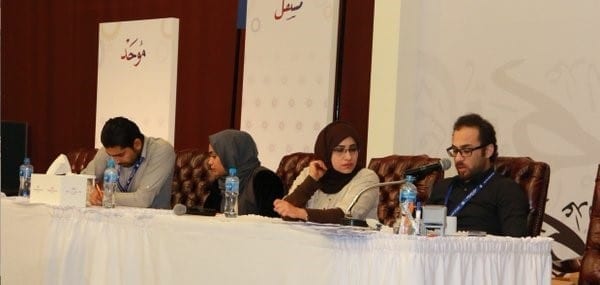
Mar 16, 2016
Even as trade union representatives from Tunisia and other trade unionists were barred from entering Bahrain to attend the General Federation of Bahrain Trade Unions (GFBTU) Congress, hundreds of union members participated in open, spirited discussions and held free elections, capped by the secretary-general’s call for continuing the democratic process.
“It is time for the democracy you and I believe in, and are called to implement, to take its course—the democracy that we have made a symbol and principle,” said GFBTU General Secretary Sayed Salman Al-Mahfood.
Mahfood, who stepped down along with three leaders who helped found the federation in 2004, said democracy means “leaving while enjoying the capacity to give.”
Four women are among the 15 newly elected members of GFBTU’s secretariat.
The democratic elections took place in a difficult environment. Just this week, Bahraini human rights activist Zainab Al Khawaja was arrested, along with her 15-month-old son, Abdul-Hadi. The arrest follows the fifth anniversary of pro-democracy uprising in February 2011.
Although Bahrain still lacks democratic practices, GFBTU has presented an alternative with its March 5-7 Congress as an example.
“What I saw was a living example of democratic practices that included thousands of workers in Bahrain,” says Nader Tadros, Solidarity Center Regional Program Director for the Middle East and North Africa.
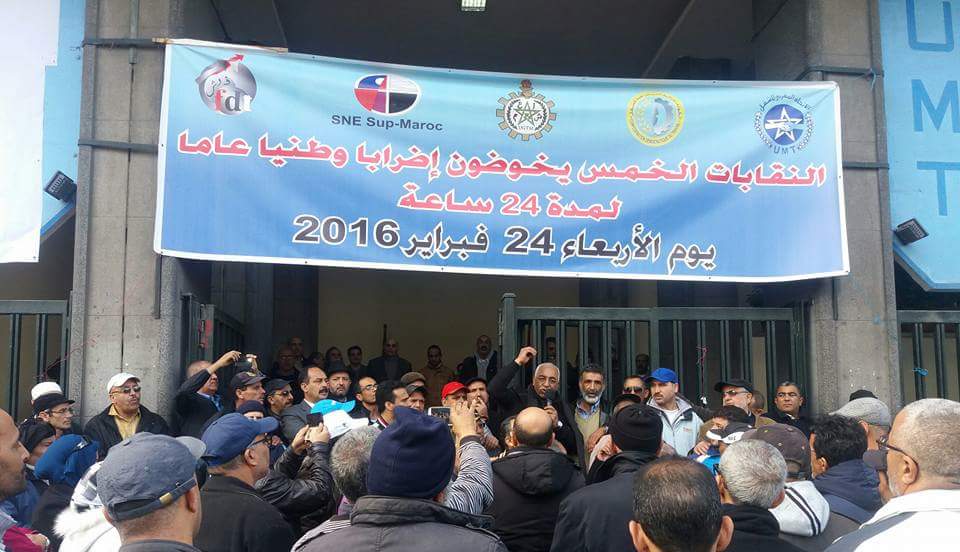
Feb 25, 2016
Hundreds of thousands of public- and private-sector workers waged a massive national strike throughout Morocco yesterday to protest the government’s unilateral approach on pension reforms, including moves to increase the retirement age, and its unwillingness to engage in dialogue with unions. Nearly 85 percent of workers joined the strike, according to union federations whose members took part, with teachers, health care workers, local government employees and port workers turning out in force.
“The strike is a message to alert the government to the seriousness of the current social situation and to meet the demands of the working class,” says Mohamed Atif, communications officer for the Democratic Labor Confederation (CDT). The unions, whose members hold a sixth of the seats in parliament, say they will block a government draft bill making pension changes.
Workers took the action after repeated calls by unions to begin negotiations went unheeded. Unions say they want to draw attention to the deteriorating economic conditions of Morocco’s working class, made worse by government’s halt to fuel subsides and violations of worker rights, including the right to strike.
The 24-hour strike included banks; postal and telecommunications services; the energy, electricity and water sectors; agriculture and fisheries; ground transportation; construction; mining; hotels, restaurants, call centers and more.
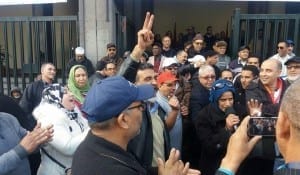
Credit: Hicham Ahmadouch/UMT
Unions called on airport workers, emergency health workers and others in key sectors to stay on the job but to wear red armbands in a show of solidarity with strikers.
Moroccan workers received widespread international support for their walkout, with theInternational Trade Union Confederation (ITUC) calling on the government to have a meaningful dialogue with unions.
“The Moroccan government is refusing to listen to its own people—the women and men who create wealth and sustain society and the economy,” says ITUC General Secretary Sharan Burrow. “The ITUC calls on the government to step back from its anti-social and confrontational approach, and have a meaningful dialogue with the unions.”
The IUF, the global union for food workers, denounced the government’s lack of willingness to negotiate with workers and called for greater respect for basic democratic principles and the rights of unions.
In addition to the CDT, major federations calling the strike include the Moroccan Labor Union (UMT), the General Union of Workers of Morocco (UGTM) and the Democratic Labor Federation (FDT). The National Union of Higher Education (SNEsup) also played a big role.










